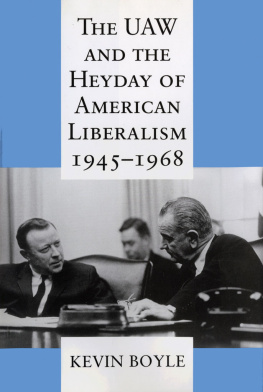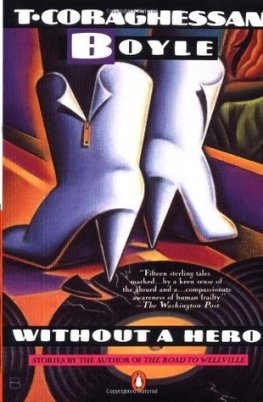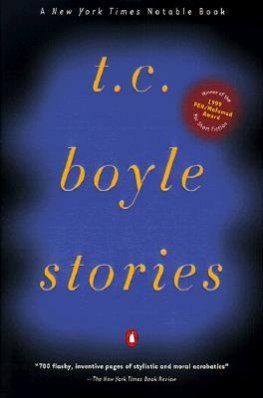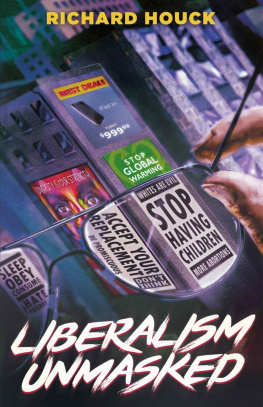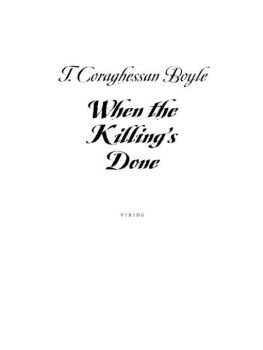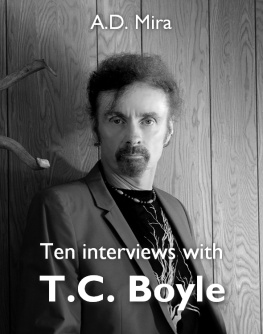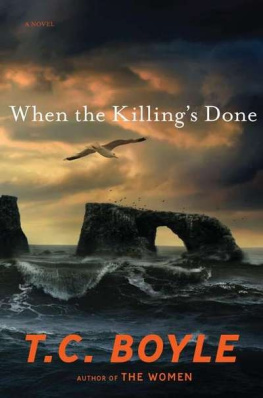Preface
I have no real memory of a time when liberalism dominated public discourse. I was two years old when African-American marchers braved the fire hoses of Birmingham, three when Lyndon Johnson declared unrelenting war on poverty, seven when Robert Kennedys funeral cortege wound its way through the cruel June night. I came of age in a period of profound political cynicism, a cynicism that cut through the governed and the governing, a cynicism that maimed and may yet destroy the activist state.
I began this book in response to that cynicism. In particular, I hoped to show the vitality of a political culture that believed government could act in the public good. In the course of my work, that job became more complicated. I became more and more aware that postwar liberals limited their agendas in important ways. I realized that the vision held by the leaders of the United Automobile Workers (UAW) did not match that of their liberal allies. And I began to see how willing the UAW was to compromise its vision to maintain the alliance on which its political power rested. Those complications did not force me to change the original intent of the book, however. Whatever their compromises, the men and women who led the postwar UAW committed their lives to the belief that government action could make American society more equitable and more just. In an age of cynicism, that is a story worth telling.
Every page of this book bears the imprint of Sidney Fine, who for ten years has served as a mentor and model. He read each of the many drafts, sharpening my analysis and my prose every step of the way. He has told me more than once that he considers his students to be members of his family. That is an honor I will always cherish.
I am indebted as well to other scholars who offered suggestions and support, large and small. Gerald Linderman, Terrence McDonald, and Howard Kimmeldorf supplied welcome guidance. Jack Barnard, Elizabeth Faue, Nancy Gabin, Gary Gerstle, Martin Halpern, and Nelson Lichtenstein commented on portions of the project. The critiques of Robert Asher, Bruce Nelson, and an anonymous reviewer improved the book immeasurably. Peter Agree of Cornell University Press shepherded a novice through the publication process with speed, patience, and grace. Barbara Salazars extraordinary editing of the manuscript made the book more readable and the notes more accessible. At the University of Toledo, Scott McNall and William Hoover helped me to secure several timely grants. And Carol Bresnahan Menning showed tremendous faith in me and my work. She was the ideal colleague. Thanks also to my new colleagues at the University of Massachusetts, who have welcomed me into a friendly and stimulating intellectual environment.
The marvelous staff at the Archives of Labor and Urban Affairs at Wayne State UniversityPhilip Mason, Warner Pflug, Patricia Bartkowski, Raymond Boryzyka, Carolyn Davis, Thomas Featherstone, William Gulley, Sandra Kimberly, William LeFevre, Margery Long, Margaret Rauscher, Kathy Schmeling, and Turanda Spencerwere unfailingly helpful and friendly. Going to that library has become the academic equivalent of going home. The staffs of the Library of Congress, the Harry S. Truman Presidential Library, the John F. Kennedy Presidential Library, the Lyndon B. Johnson Presidential Library, the Martin Luther King Jr. Center for Nonviolent Social Change in Atlanta, the Minnesota Historical Society in St. Paul, the Seeley G. Mudd Manuscript Library at Princeton University, and the Michigan Historical Society in Ann Arbor also provided valuable assistance. I benefited from conversations with several UAW officials: Irving Bluestone, William Dodds, Douglas Fraser, Joseph Rauh Jr., Victor Reuther, Paul Schrade, and Leonard Woodcock. Chapter 6 includes material that appears in slightly different form in There Are No Sorrows the Union Cant Heal: The Struggle for Racial Equality in the United Automobile Workers, 19451960, Labor History, Winter 1995. I am grateful to the editor, Daniel Leab, for permission to use that material here. The project was funded by the Horace H. Rackham School of Graduate Studies of the University of Michigan, the Henry Kaiser Family Foundation, the Rockefeller Foundation, the National Endowment for the Humanities, and two University of Toledo Summer Fellowships.
I cannot imagine having completed this work without the support of friends and family. Gail Hoffman and Michael Martin, Marty Hershock, Terry and Cindy Hopman, Kevin Hurst, Mike Smith, Joe and Nancy Tolkacz, Brian and Kathy Boyle, and Charlie Trierweiler have done more for me than I can ever repay. Rich Bodek, Jed and Janet Kuhn, Sue Darlington, and Dan Clark made Ann Arbor a special place. Lisa Heinemann, Johanna Schoen, and Glenn and Beth Ames did the same for Toledo. My in-laws, Art and Judy Getis, have shown me how an academic family should work. My parents, Kevin and Anne Boyle, have been constant sources of inspiration. They taught me to love books and ideas, and they taught me simply to love. Abby and Nan spurred me to finish revisions, then have slowed my academic work to a snails pace. I couldnt be happier. Finally, Vicky has infused my work and my life with more joy than I ever dreamed possible. For that and for so much more, this book is dedicated to her.
KEVIN BOYLE
Amherst, Massachusetts

